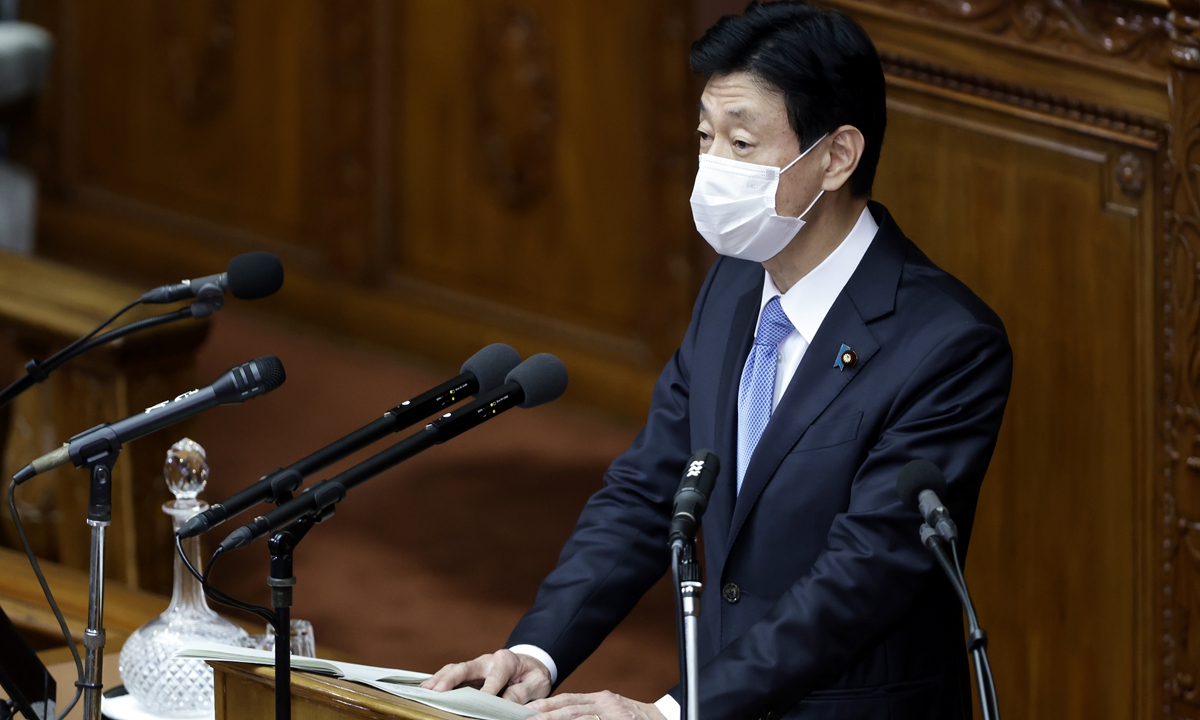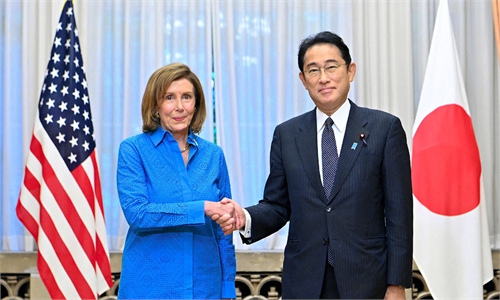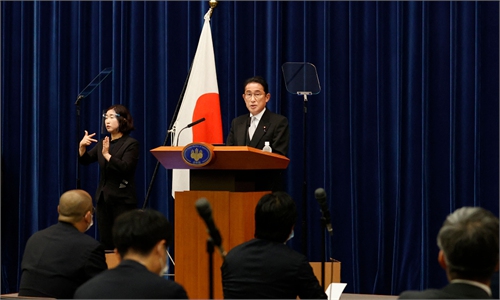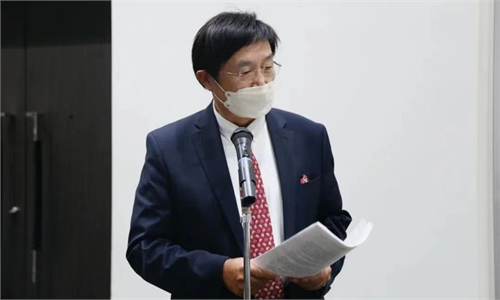Japan warned of returning to old path of militarism, after cabinet member visits infamous Yasukuni Shrine

Yasutoshi Nishimura Photo: VCG
Although it has been 77 years since Japan's unconditional surrender in World War II, some Japanese senior politicians still seem obsessed with their country's past war of aggression, as Japan's industry minister on Saturday became the first member of Prime Minister Fumio Kishida's cabinet to visit the infamous Yasukuni Shrine.
The visit to the Yasukuni Shrine, which enshrines Japan's infamous Class-A war criminals who symbolize Japan's war atrocities and militarism during WWII, was widely condemned by neighboring countries and regions. Observers slammed the visits to the shrine as attempts to justify Japan's history of aggression, while warning that Japan has gone far in strengthening its military power with the intent to return to the old path of militarism.
Japanese Minister of Economy, Trade and Industry Yasutoshi Nishimura on Saturday visited the shrine after he was appointed as a member of Kishida's new cabinet on Wednesday.
"I resolved to do my utmost for the peace and development of Japan, while thinking of the late Prime Minister Shinzo Abe," Nishimura told reporters on Saturday, according to Kyodo News.
Nishimura was an important confidant of Abe who was shot dead last month and a member of the Abe faction - the major internal political bloc of the ruling Liberal Democratic Party (LDP), according to Japanese media.
The "wish for world peace" mentioned by such a right-wing politician is ironic especially as he visited Yasukuni which enshrines the main culprits of the past world chaos, invasion and colonization, Wang Guangtao, an associate research fellow at the Center for Japanese Studies at Fudan University, told the Global Times on Sunday.
The visit to the Yasukuni Shrine once again shows the Japanese government's erroneous attitude toward historical issues, Wang Wenbin, spokesperson of the Chinese Foreign Ministry, said on Sunday, noting that China has lodged solemn representations with Japan.
We urge the Japanese side to own up to and deeply reflect on its history of aggression, properly handle relevant issues with a sense of responsibility and win the trust of its Asian neighbors and the larger international community through concrete actions, the spokesperson said.
South Korea on Saturday expressed "deep disappointment and regret" at Nishimura's visit. The shrine "glorifies Japan's past war of aggression and enshrines war criminals," the South Korean Foreign Ministry said in a statement, according to Reuters.
Some Japanese conservative forces still seem obsessed with their country's past war of aggression, which is out of step with world trends, and would undermine the hard-won peace and stability in East Asia and the world, observers condemned.
Some other cabinet members such as far-right politician Sanae Takaichi, economic security minister, is likely to visit the shrine on Monday which will mark the 77th anniversary of Japan's unconditional surrender in WWII, predicted Da Zhigang, director of the Institute of Northeast Asian Studies at Heilongjiang Provincial Academy of Social Sciences. The expert noted that many Japanese lawmakers have visited the shrine in recent years, but there were few visits by Japanese cabinet members.
Japan has already gone far in strengthening its political and military power, Wang warned, noting that the visit is an attempt to justify Japan's history of aggression. Da said although this year is the 50th anniversary of the establishment of China-Japan relations, tensions between China and Japan are still tough, in the context that Japan is cooperating with the US and is dragging some European countries to contain China, and stirring up troubles on the Taiwan question after US House Speaker Nancy Pelosi's provocative visit to Taiwan island.
Visits to the Yasukuni Shrine will only be another blow to bilateral ties with China, the expert warned.
As Sunday is the 10th memorial day for "comfort women" who were forced into sexual slavery by the Japanese military during WWII, the Memorial Hall of the Victims in Nanjing Massacre by Japanese Invaders on Sunday called on the public to not forget the history and pass on the truth of the history.
From 1931 to 1945, more than 200,000 Chinese women were forcibly recruited as "comfort women" by the invading Japanese army. They were tortured, some tortured to death, but Japanese right-wing forces denied the history, the Nanjing memorial hall condemned. The Nanjing organization urged Japan to officially apologize to the "comfort women," fewer than 20 of whom are still alive.
According to Taiwan media, former regional leader Ma Ying-jeou attended an event to commemorate the memorial day for "comfort women" on Sunday, and urged Japan to apologize to and compensate them. He criticized the current Democratic Progressive Party authorities on the island for their silence on the historic issue and for even trying to erase the historical memory of the "comfort women."




